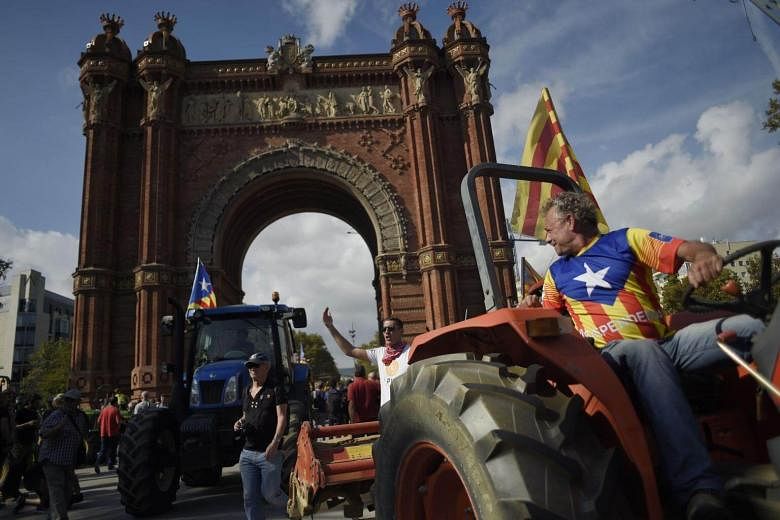BARCELONA (AFP) - Catalonia's leader could declare independence from Spain on Tuesday (Oct 10), after a disputed referendum, in what would be an unprecedented move to create a separate region.
Here is a look at what could happen next:
Several steps
Although Catalan president Carles Puigdemont has vowed to press ahead with the split from Madrid, he is at pains to stress there is no "button" to press for instant independence.
Any independence declaration will be rejected by the Spanish government and courts, and by many people even in Catalonia, which polls show to be divided on secession.
The separatists' roadmap for independence consists of a declaration of independence followed by a series of legislative steps and votes to set up a new state, which could take months.
Puigdemont has called for EU mediation, an idea that Prime Minister Mariano Rajoy has rejected outright.
Careful not to undermine Rajoy, the European Union has merely called for dialogue between the two sides.
Catalan leaders say they want to remain part of the European Union, but Brussels says that an independent Catalonia would automatically be out and have to reapply to join.
Legal wiggle room
The separatists' plan envisions a legal transition period covering the time it takes to adopt a new constitution declaring the regional leader as the new head of a Catalan state.
The regional government would replace Madrid as the official authority in Catalonia, allowing it to craft its own laws on issues such as defence and border security.
But the separatist proposal was slapped down by Spain's constitutional court and Madrid has insisted unilateral secession would change nothing, legally speaking.
Is Catalonia ready?
Even some of the most enthusiastic supporters of independence admit Catalonia is ill-prepared for total self-rule.
"No country (in the world) can function independently overnight," said former Catalan leader Artur Mas.
The region, roughly the size of Belgium and home to 7.5 million people, has its own police force, but it ultimately still takes orders from Madrid.
It has control over areas including healthcare and education, but Catalonia still lacks basic state-building infrastructure such as the ability to raise its own tax revenue.
Its main ports, airports, rail and telecoms network as well as its energy grid are all under Madrid's control.
And Madrid runs the armed forces, the national police and has the ability to deploy thousands of security personnel at key sites on short notice.
Who would recognise it?
Although one of Spain's richest regions, Catalonia is heavily debt-laden.
Ratings agencies have given it a low "speculative" grade, which means Catalonia struggles to borrow directly on financial markets, making it dependent on loans from the central government.
Moves by Madrid to impose its authority on Catalonia could risk further protests or even unrest in the region.
In a sign of the potential for violence, police beat unarmed voters while trying to close down polling stations during the referendum vote.
That shocked even many Catalans who were opposed to independence and sparked angry demonstrations against the police.
But for the moment no other country has come out in support of the separatist cause.
Ultimately, EU members "will not recognise Catalonia as a state if it is created in violation of the law and particularly the Spanish constitution", said Jean-Claude Piris, an expert in European law.

